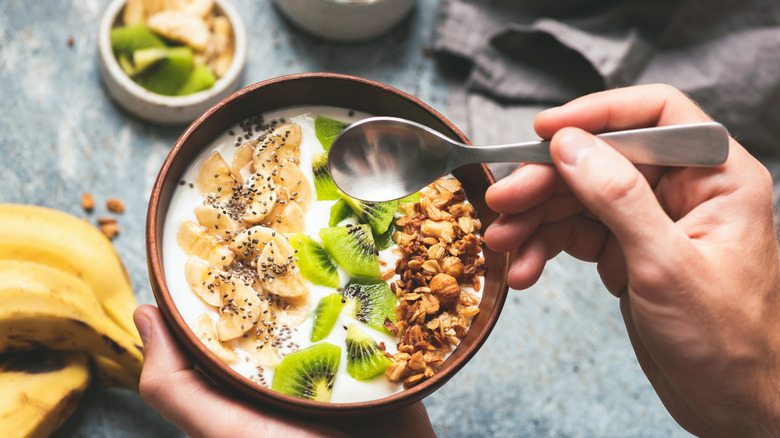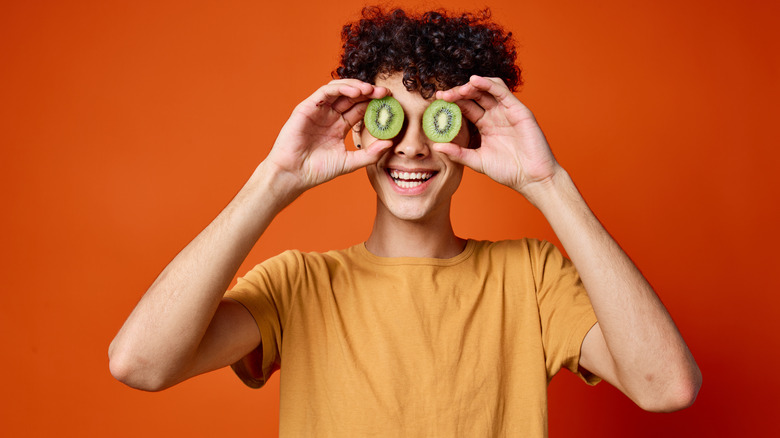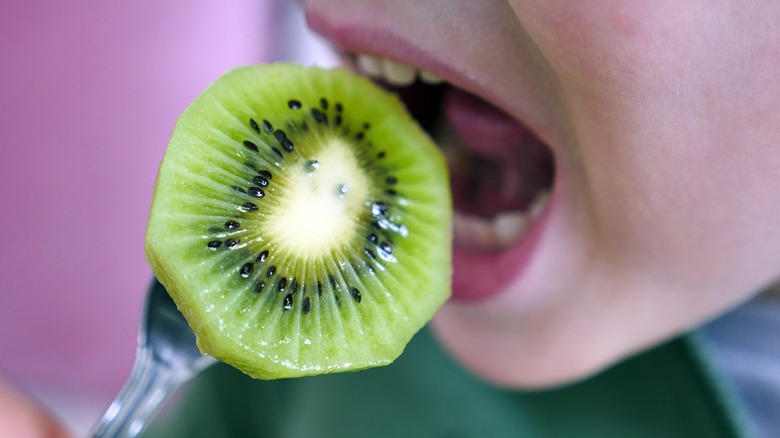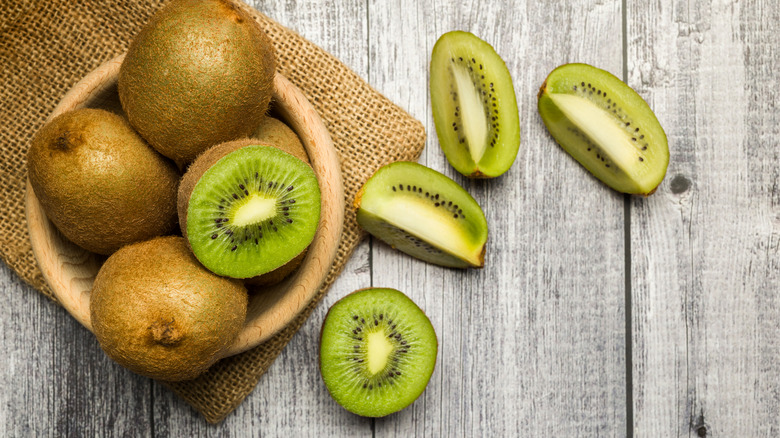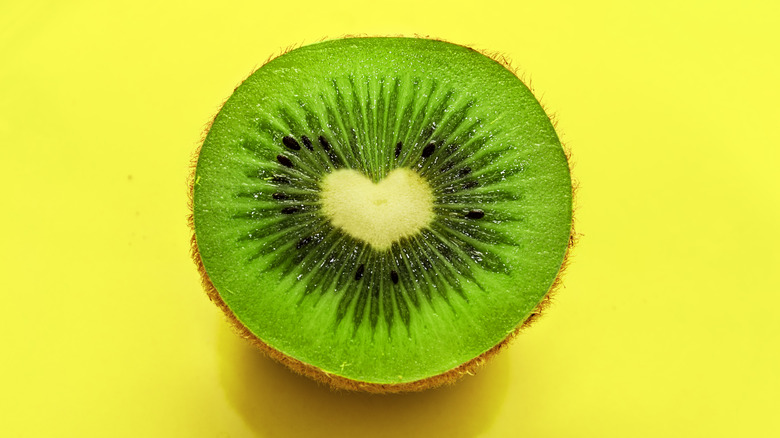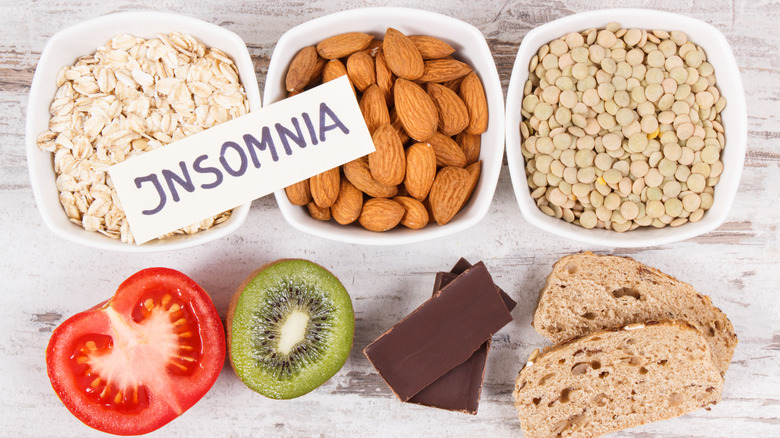Unexpected Side Effects Of Eating Kiwi
One popular fuzzy fruit that regularly finds its way onto the breakfast or lunch table is kiwifruit. Whether it's sliced up on top of oatmeal or eaten by the spoonful, kiwis are a beloved healthy snack known for their bold and sweet flavor. Because they're loaded with dietary fiber, antioxidants, vitamin C, and many other vitamins, kiwis support health in a variety of ways (via WebMD).
For instance, it's been well documented that consuming vitamin C-rich fruits and vegetables may help improve vitality (via Eat This, Not That!). When it comes to eating kiwis (a vitamin C-rich fruit), one 2020 study found the consumption of two whole SunGold kiwis per day improved the feelings of vitality in adults with low levels of vitamin C.
Keep in mind that these beauties come in two different varieties. Slice open a SunGold kiwi with its smooth and hairless skin, and you'll be staring at a sunny-colored flesh with a sweet flavor. One serving contains 100 calories, 261 milligrams of vitamin C, and 510 milligrams of potassium (per Zespri Kiwifruit). Then again, if you cut open a kiwi with a bright green interior and fuzzy skin, you're looking at a classic green kiwifruit, with a sweet yet subtle sour flavor. Zespri Kiwifruit points out that green kiwi is lower in calories (90 calories per serving), higher in potassium (462 milligrams) and lower in vitamin C (137 milligrams). With similar nutritional content, you can't go wrong with either variety, so taste preference is key!
Kiwis may offer protection from eye diseases
On top of regular eye exams which support eye health, also known as ocular health, it's important to protect your eyes against diseases. Two professors from North Dakota State University, Dr. Sherri Nordstrom Stastny, and Julie Garden-Robinson, explain, "Nearly 2 million people in the United States suffer from vision loss related to macular degeneration, a deterioration of the retina that is often associated with age" (via SFGate).
Because kiwis contain high levels of carotenoids, antioxidants, and vitamins, WebMD points out eating kiwis can support overall eye health and offer protection from eye-related diseases. In particular, kiwi contains the carotenoids lutein and zeaxanthin. This is also what the center of your retina, or macula, is made up of. Kiwis also contain high amounts of copper. According to Healthline, your nervous system (which includes your optical nervous system) is dependent on copper to work properly. Consuming kiwi may prevent macular degeneration by rebuilding your retina, since a cup of kiwi contains 220 micrograms of these carotenoids and 20% of your daily recommended amount of copper.
Kiwis support your immune system
One of the kiwi's superpowers is that it's jam-packed with vitamin C, which is important for immunity and supports our overall health in a number of ways. "The more we study vitamin C, the better our understanding of how diverse it is in protecting our health — from cardiovascular, cancer, stroke, eye health [and] immunity to living longer," explains Dr. Mark Moyad to WebMD. Evidence suggests it can also fight against some common skin aging signs like wrinkles.
Dr. Moyad recommends consuming no more than 2,000 milligrams of vitamin C daily. He notes that 500 milligrams daily is a generally safe amount. In fact, if you're consuming two kiwifruits daily, you'll meet 100% of your daily vitamin C intake, shares Eat This, Not That!. For fans of the golden yellow kiwi, you're looking at 290% of the daily value of vitamin C, while eating two sweet-tart green kiwis contains 150% of the daily value.
Additionally, being rich in antioxidants is another one of kiwi's superpowers. Antioxidants are crucial for overall well-being, since they fight free radicals, help prevent damage from oxidative stress, and lower inflammation in the body — which ultimately may prevent diseases (via WebMD).
Kiwis support your digestive system
Whether you're a fan of golden yellow or vibrant green kiwis, both kiwifruits are a good source of dietary fiber. Dietary fiber is necessary for a healthy digestive system as it supports a healthy weight, keeps your bowels regular, increases your lifespan, and encourages a healthy gut (via Mayo Clinic).
What's impressive about kiwis is that they contain an enzyme called actinidin (via Advances in Food and Nutrition Research). Research suggests this enzyme is responsible for supporting the digestive process. More specifically, actinidin found in kiwis encourages digestion in the gastrointestinal tract and small intestine (per Advances in Food and Nutrition Research). This is because kiwi (particularly green kiwi) has the ability to influence the way that your body digests food proteins. Some of these rich protein sources listed by the researchers include fish, eggs, cereal proteins, milk, legumes, and meat.
Believe it or not, eating kiwi with the skin on is good for you. One 2018 study indicated that devouring the fuzzy (or smooth, hairless) skin can boost fiber by 50%, increase vitamin E by 34%, and offer 32% higher folate content when compared to only eating the juicy flesh.
Your heart health may improve
Not only does dietary fiber support gut health and keep you regular, but fiber can also reduce the odds of heart-related diseases (per WebMD). This is because fiber helps lower "bad cholesterol" levels, also known as low-density lipoprotein cholesterol. This, in turn, reduces overall cholesterol levels (via Mayo Clinic). For this reason, the high fiber content found in kiwis possesses several health benefits.
Data from one study indicated that kiwifruit has the ability to lower total blood pressure. During the study, participants (male and female) with moderately elevated blood pressure levels were asked to eat kiwis three times a day for eight weeks, while the control group ate one apple a day. After 8 weeks, the kiwifruit participants showed lower systolic and diastolic blood pressure compared to participants in the control group. WebMD points out that the combination of high fiber and vitamin C content may be one explanation of why kiwis encourage healthy blood pressure levels. It's also important to note that kiwis lower the chances of heart disease and stroke.
Eating kiwis may improve your sleep quality
Quality sleep is crucial for overall health. But sometimes with demanding schedules, late-night gatherings, or sleep problems, it can be difficult to get quality sleep. In fact, 35.2% of American adults reported to the Centers for Disease Control and Prevention that their sleep duration is less than 7 hours. With this in mind, it's understandable why many adults may be seeking natural sleep-promoting aids. While there's no magic pill to get a good night's rest, research shows that kiwis come pretty close.
According to a 1990 study, kiwis promote high-quality sleep and affect sleep duration. During the study, researchers asked participants to eat two kiwis at least one hour before going to sleep for four weeks. Not only did the consumption of kiwis before bed improve the overall quality of sleep, but participants also reported falling asleep quicker and sleeping more. In fact, their total sleep time improved by 13%, while their sleep efficiency (not waking up during the night) improved by 5%.
Healthline shares that some explanations of the sleep-inducing effects of kiwifruit could be the high vitamin C content, the carotenoids, and serotonin found within the fruit. While more research is needed to fully understand the role kiwis play in sleep, it's generally safe to munch on this colorful snack to avoid any sleeping woes.

